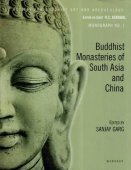Lumbini, Lumbinī: 8 definitions
Introduction:
Lumbini means something in Buddhism, Pali, Hinduism, Sanskrit. If you want to know the exact meaning, history, etymology or English translation of this term then check out the descriptions on this page. Add your comment or reference to a book if you want to contribute to this summary article.
Images (photo gallery)
(+4 more images available)
In Buddhism
Theravada (major branch of Buddhism)
Source: Pali Kanon: Pali Proper NamesA park situated between Kapilavatthu and Devadaha. It was there that the Buddha was born. (J.i.52, 54; Kvu.97, 559; AA.i.10; MA.ii.924; BuA.227; Cv.li.10, etc.). A pillar now marks the spot of Asokas visit to Lumbini. According to an inscription on the pillar, it was placed there by the people then in charge of the park to commemorate Asokas visit and gifts (See Mukerji: Asoka, p.27; see p.201f for details). The park is now known as Rummindei, inside the Nepal frontier and two miles north of Bhagavanpura.
In the Sutta Nipata (vs. 683) it is stated that the Buddha was born in a village of the Sakyans, in the Lumbineyya Janapada. The Buddha stayed in Lumbinivana during his visit to Devadaha and there preached the Devadaha Sutta. MA.ii.810.
Theravāda is a major branch of Buddhism having the the Pali canon (tipitaka) as their canonical literature, which includes the vinaya-pitaka (monastic rules), the sutta-pitaka (Buddhist sermons) and the abhidhamma-pitaka (philosophy and psychology).
Mahayana (major branch of Buddhism)
Source: Wisdom Library: Maha Prajnaparamita SastraLumbinī (लुम्बिनी) or Lumbinīvana is the name of an ancient forest, according to Mahāprajñāpāramitāśāstra (chapter 41).—Accordingly, “[The eighteen āveṇika-dharmas (‘special attributes’)]— [...] (6). The Buddha has no unconsidered equanimity.—He has no unconsidered equanimity.—[...] [Question].—What are the reasons why he leaves them knowingly? [Answer].—In the middle of the great assemblies, the Buddha is tired and that is why he wants to rest for a while. Furthermore, from lifetime to lifetime, the Buddha has always liked solitude (naiṣkramya). When, as a Bodhisattva, he was in his mother’s womb (mātṛkukṣi), his mother loved solitude as well, and it was at forty li from the capital, in the forest of Lumbinīvana she gave birth to him. [...]”.

Mahayana (महायान, mahāyāna) is a major branch of Buddhism focusing on the path of a Bodhisattva (spiritual aspirants/ enlightened beings). Extant literature is vast and primarely composed in the Sanskrit language. There are many sūtras of which some of the earliest are the various Prajñāpāramitā sūtras.
General definition (in Buddhism)
Source: Wisdom Library: BuddhismLumbini is Buddhas Birthplace.
Languages of India and abroad
Sanskrit dictionary
Source: DDSA: The practical Sanskrit-English dictionaryLumbinī (लुम्बिनी).—Name of a grove and the birthplace of Gautama Buddha; सान्तःपुरना देवी कदाचिदथ लुम्बिनीं (sāntaḥpuranā devī kadācidatha lumbinīṃ) (jagāma) Bu. Ch.1.23.
Source: Cologne Digital Sanskrit Dictionaries: Edgerton Buddhist Hybrid Sanskrit DictionaryLumbinī (लुम्बिनी).—(1) (= Pali id.) name of the grove where Śākyamuni was born: Lalitavistara 78.19; 79.11, 16; 81.8 (°nīye, loc. sg., attributed to a non-existent adj. lumbinīya in [Boehtlingk and Roth]); 91.16; all these verses, also, with °ni m.c., 234.19; 252.19; 411.21; °nī Mahāvastu iii.112.9; Mahāvyutpatti 4123; Karmavibhaṅga (and Karmavibhaṅgopadeśa) 82.1; often °nī-vana, Mahāvastu i.149.3; ii.18.10 ff.; 145.6; Divyāvadāna 389.16; Gaṇḍavyūha 365.5, etc.; (2) seemingly, name of a tree, = plakṣa: dadarśa 'tha lumbinīṃ Mahāvastu i.99.8 (verse), followed by tasyāḥ śākhāṃ…(the subject is Māyā, in the Lumbinī grove); see also lumba; (3) name of a class of deities: Mahāsamājasūtra, Waldschmidt, Kl. Sanskrit Texte 4, 191.1 lumbinī lumbinī- śreṣṭhā(ḥ); confirmed Tibetan
Source: Cologne Digital Sanskrit Dictionaries: Monier-Williams Sanskrit-English DictionaryLumbini (लुम्बिनि):—f. (mc.) or f(ī). Name of a princess and a grove named after her, [Buddhist literature] (cf. [Monier-Williams’ Buddhism 389]).
[Sanskrit to German]
Sanskrit, also spelled संस्कृतम् (saṃskṛtam), is an ancient language of India commonly seen as the grandmother of the Indo-European language family (even English!). Closely allied with Prakrit and Pali, Sanskrit is more exhaustive in both grammar and terms and has the most extensive collection of literature in the world, greatly surpassing its sister-languages Greek and Latin.
See also (Relevant definitions)
Starts with: Lumbini Park, Lumbinishreshtha, Lumbinivana, Lumbiniya.
Full-text (+2): Lumbiniya, Lumbineyya, Lumba, Butul, Lumbinivana, Sutejomandalaratishri, Kapilavastu, Sakyamuni, Vikira, Samvejaniya Tthana, Newa, Twenty Eight Buddhas, Bodh Gaya, Supernatural birth, Purvanimitta, Seven Buddhas, Kapilavatthu, Stupa, Siddhartha, Vairocana.
Relevant text
Search found 33 books and stories containing Lumbini, Lumbinī; (plurals include: Lumbinis, Lumbinīs). You can also click to the full overview containing English textual excerpts. Below are direct links for the most relevant articles:
The Buddha (by Piyadassi Thera)
An Arrival Auspicious < [April – June, 1999]
Siddhartha’s Great Transformation < [July – September, 1994]
‘The Triple Stream’ < [January 1956]
The Great Chronicle of Buddhas (by Ven. Mingun Sayadaw)
Part 4 - Queen Mahā-Māyā’s Journey from Kapilavatthu to Devadaha < [Chapter 1 - The Story of Sataketu Deva, The Future Buddha]
Part 39 - Four Places that inspire Emotional Religious Awakening < [Chapter 40 - The Buddha Declared the Seven Factors of Non-Decline for Rulers]
Part 4 - The Birth of the Bodhisatta < [Chapter 1 - The Jewel of the Buddha]
Settlement in Early Historic Ganga Plain (by Chirantani Das)
Part 3 - Important trade routes of Vārāṇasī < [Conclusion]
Part 7 - Location and trade routes of the Vārāṇasī region < [Chapter V - Rise of Vārāṇasī as a Nodal Centre]
The Fo-Sho-Hing-Tsan-King (A Life of Buddha) (by Samuel Beal)
Appendix I - Comparative List of the Buddhacarita
Appendix II - The thirty-two miraculous signs
Varga 1. The Birth < [Kiouen I]
The Gospel of Buddha (by Paul Carus)
Related products






